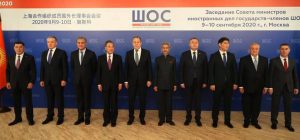Foreign ministers from across the Shanghai Cooperation Organization (SCO) are in Moscow this week for meetings. The organization’s headline yearly summit, the gathering of the heads of states, was originally planned for July 21-23 and was postponed along with the BRICS summit earlier this year. Those meetings have yet to be rescheduled.
Russia, which holds the SCO’s rotating presidency for 2019-2020, managed to gather the foreign ministers in Moscow despite the ongoing coronavirus pandemic. With Russian Foreign Minister Sergei Lavrov playing host, the attendees included Chinese Foreign Minister Wang Wi, Kazakh Foreign Minister Mukhtar Tleuberdi, Kyrgyz Foreign Minister Chingiz Aidarbekov, Tajik Foreign Minister Sirodjidin Aslov, Uzbek Foreign Minister Abdulaziz Kamilov, Indian Foreign Minister S. Jaishankar, and Pakistani Foreign Minister Shah Mahmood Qureshi, as well as the SCO’s Secretary General Vladimir Norov and others.
Russian President Vladimir Putin spoke to the group via videolink.
The SCO as we know it now was originally rooted in a 1995 treaty, and dubbed the Shanghai Five in 1996, with China, Kazakhstan, Kyrgyzstan, Russia, and Tajikistan as members. Uzbekistan joined in 2001 and the group — initially focused closely on military and border matters between China and what had been the Soviet Union until 1991 — transformed into the SCO, with ambitions of deeper cooperation.
Last year, around the occasion of the leaders’ summit in Bishkek, Kyrgyzstan, I opined on the expansion of the SCO in 2017 to include India and Pakistan:
The perpetual tumult of India-Pakistan relations was a concern for regional observers — can the SCO’s Shanghai Spirit — “mutual trust, mutual benefit, equality, consultation, respect for diverse civilizations and pursuit of common development” as the Chinese put it — thrive if some of its members are on the edge of conflict with regularity?
The answer is broadly yes: The SCO has weathered conflict between members in the past with a combination of fingers-in-the-ear ignoring of tensions and platitudes about respect for internal affairs and appeals for stability. But at the same time, that status quo also arguably hamstrings the group’s ability to operate beyond the boundaries of talk shops and counterterrorism exercises, not to mention undercuts its international credibility. Without question, the inclusion of India and Pakistan gave the SCO a broader region and a larger percentage of the world’s population. Yet it also introduced new points of friction that undercut the believability of the Shanghai Spirit.
If in 2019, as I wrote, India-Pakistan tensions had hit a new low I did not quite fathom how low India-China relations would tumble in 2020. How fares the Shanghai Spirit now?
As India and China stand on the brink of war in the Himalayas, their foreign ministers gathered in Moscow. While the SCO, as a group, made no mention of the tensions invariably that was the key topic in several of the sideline conversations had between various ministers.
The statement after the September 10 meeting contains all the usual diplomatic jargon plus necessary and anodyne references to the pandemic. There’s an endorsement of a “multipolar world,” and the predictable hailing of the 75th anniversary of the “victory of the peoples over Nazism, fascism and militarism…” There are references to how concerning terrorism is, alongside separatism and other security matters, including keeping space free of weapons. Afghanistan scored its usual paragraph, stressing an Afghan-led peace process.
The Belt and Road Initiative (BRI) prompts a diversion from the collective tone. The statement expresses support for the BRI from the foreign ministers of Kazakhstan, Kyrgyzstan, Pakistan, Russia, Tajikistan, and Uzbekistan — India is noticeably, but not surprising, left off that list.
There’s something quite remarkable that two members of the SCO — this time China and India — could be experiencing such extreme tension in their bilateral relationship but still gather for the SCO. The SCO would like say that’s the beauty of the Shanghai Spirit; the SCO’s critics would say it exposes, yet again, the organization’s overall impotence.
Meanwhile, it’s certainly come to pass that the SCO, numerically dominated by Central Asian states, offers little prominence to them. Coverage of the foreign minister meeting, internationally, is liable to focus on sitdowns between China’s Wang and Pakistan’s Qureshi, Wang and India’s Jaishankar and Lavrov’s meetings with all three, underscoring Russia’s interests across the board and specifically in figuring a way to get India and China back on sound diplomatic footing.
It will get less coverage, but Central Asia’s foreign ministers have held their own sideline talks. Uzbekistan’s Kamilov met with Wang, probably one of the more critical sideline sit-downs for the Central Asian states. Kamilov also had meetings with Lavrov and Jaishankar.

































